Top 7 Business Ideas in Software for 2025
The journey to a successful software company begins with a single, powerful idea. But in a crowded market, how do you find a concept that's not just innovative but also viable and market-ready? The days of relying solely on guesswork are over. Today, a new generation of powerful tools and platforms empowers entrepreneurs to discover, validate, and refine business ideas in software with unprecedented precision and speed. From platforms that analyze emerging trends to marketplaces showcasing profitable micro-startups, the right resources can significantly de-risk your venture before you write a single line of code.
This guide curates the seven essential websites and platforms every aspiring software founder should know. We'll cut straight to the chase, exploring how each resource works, its unique strengths, and how you can leverage it to move from a spark of inspiration to a data-backed business plan. Each entry includes direct links and screenshots to help you immediately start your research. We will show you exactly how to find and validate your next software venture, setting you on the path to building a truly impactful product. This isn't just a list; it's a strategic toolkit for building a successful software business from the ground up.
1. SaaSThink
SaaSThink is an advanced AI-powered idea generation platform designed specifically for entrepreneurs looking to find their next big venture. Instead of providing generic prompts, it delivers a comprehensive, data-driven framework to uncover and validate unique business ideas in software. This tool stands out by combining AI-driven creativity with rigorous market analysis, giving founders a powerful head start.
The platform's core function is its ability to generate market-ready SaaS concepts in under two minutes. It achieves this by analyzing current market trends, performing detailed competitor research using real G2 ratings, and validating the problem or challenge the proposed software aims to solve. This multi-faceted approach ensures that the ideas generated aren't just innovative but also commercially viable.
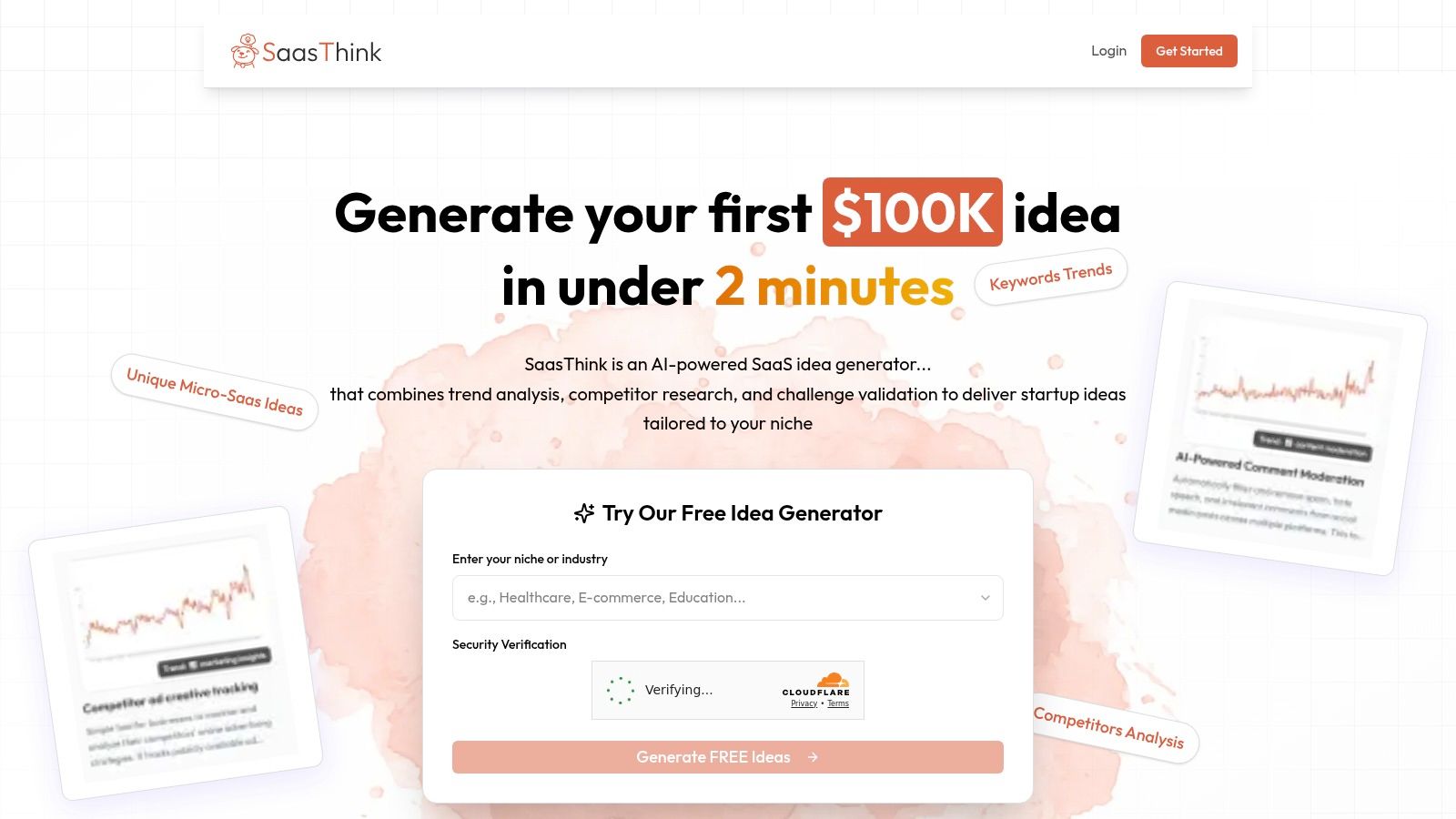
Key Features and Strategic Advantages
What truly sets SaaSThink apart is the depth of its analytical toolkit. It moves far beyond simple idea generation by equipping users with the intelligence needed to make informed decisions.
- Comprehensive Market Insights: For each idea, the platform provides 3-year keyword trend data, competitor analysis with visual radar charts, and potential monetization strategies. This allows you to quickly gauge market demand and competitive saturation.
- Pre-Validated Concepts: SaaSThink boasts an extensive library of over 1,000 generated ideas and more than 100 pre-validated concepts. This curated list is an invaluable resource for entrepreneurs seeking inspiration or a proven starting point for their venture. Exploring these ideas can also help you understand what makes a strong SaaS concept.
- Actionable Reporting: A standout feature is the ability to export detailed analysis into professional PDF reports. These are perfect for creating pitch decks, sharing with potential co-founders, or presenting to investors, adding a layer of professionalism and data-backed credibility to your proposal. For more information on how these tools can be leveraged, you can explore the insights on SaaSThink's idea generator tools.
Pricing and Access
SaaSThink offers a flexible pricing model designed to accommodate users at different stages of their entrepreneurial journey. There is a Free Plan that provides basic access and community support, making it an excellent entry point. For more advanced features, a Premium Plan is available for a one-time payment of $25, and a Lifetime Founder Plan costs $120. The absence of recurring subscriptions makes it a cost-effective choice for early-stage founders.
Pros:
- Generates unique, market-ready SaaS ideas with AI-driven trend and competitor analysis.
- Provides comprehensive insights including keyword trends and visual metric breakdowns.
- Flexible, no-subscription pricing with free, premium, and lifetime plans.
Cons:
- A credit-based system may require additional purchases for high-volume idea generation.
- Full access to advanced features and premium ideas is reserved for paid tiers.
Website: https://www.saasthink.app
2. Exploding Topics
Exploding Topics is a trend intelligence platform designed to help entrepreneurs discover fast-growing topics, products, and industries before they hit the mainstream. Unlike traditional keyword research tools that focus on current search volume, this platform identifies "exploding" trends by analyzing signals from online conversations, search data, and media mentions. This makes it an invaluable resource for anyone seeking validated business ideas in software, as it pinpoints emerging user needs and market gaps.
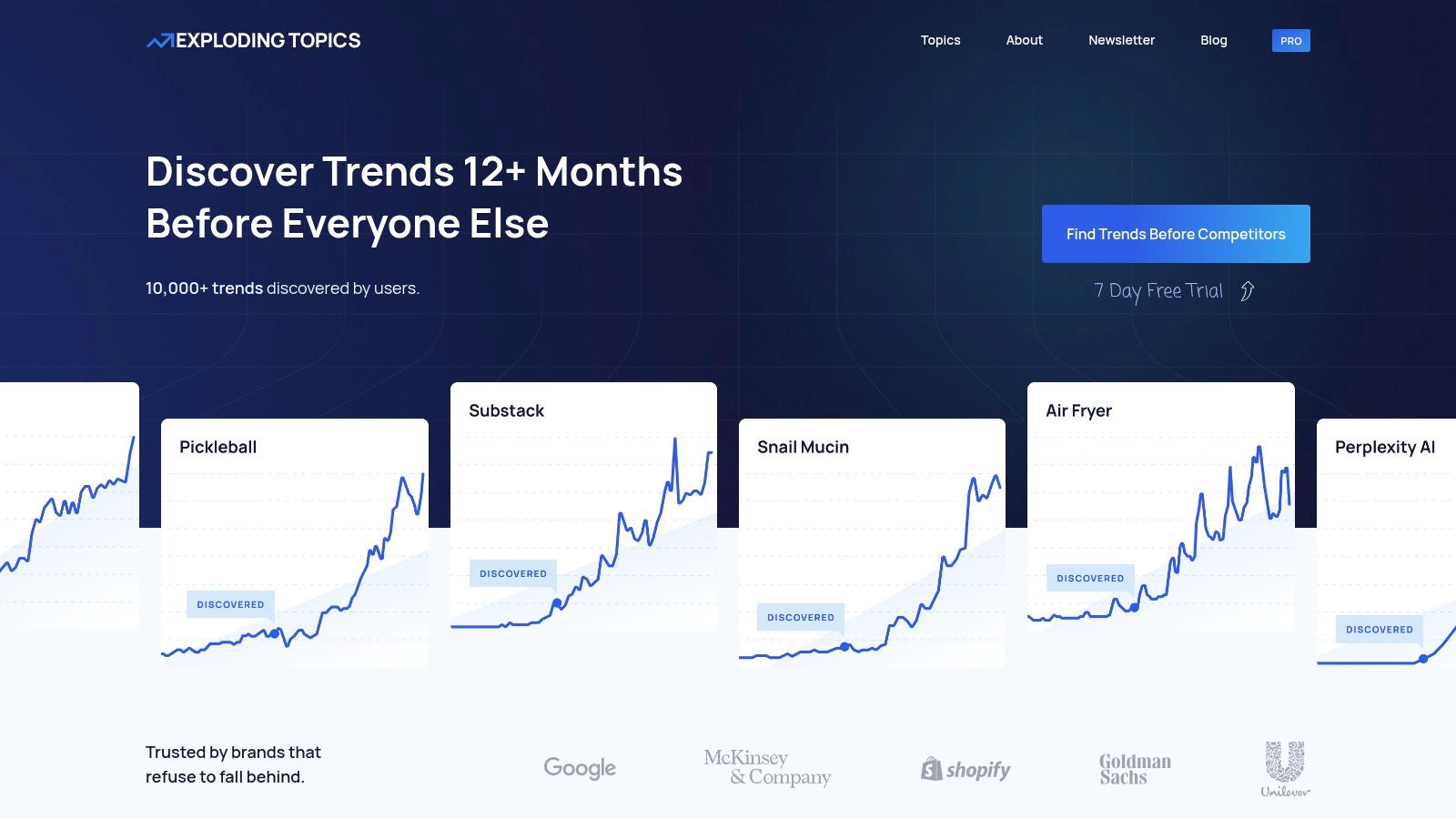
The platform excels at providing data-driven context. For each trend, you get a growth graph, related topics, and a curated list of relevant news articles and startups. This allows you to not just see what is trending but also understand why and how others are capitalizing on it.
Key Features and Benefits
- Trends Database: Access a searchable database of thousands of trending topics across various categories like tech, health, and finance, complete with 5-year growth data.
- Meta Trends: The platform connects individual trends into broader "Meta Trends," helping you understand the bigger picture and develop more comprehensive software solutions.
- Trending Startups & Products: Discover new companies and products gaining traction in a specific niche, which is perfect for competitive analysis and market validation.
- Project Tracking: Save and monitor trends relevant to your potential software ideas, receiving alerts as they evolve.
How to Use It for Software Ideas
A practical approach is to filter trends by category (e.g., "Software") and sort by growth rate. Look for rising technologies or business problems that lack a dominant software solution. For instance, you might spot a surge in interest for "AI-powered contract review" for small law firms. This signal provides an evidence-based starting point for a SaaS product. Learn more about effective SaaS idea generation strategies to make the most of these insights.
Pricing: The platform offers a free newsletter with weekly trends. Paid plans start at $39/month (billed annually) for the "Entrepreneur" tier, with more expensive "Investor" and "Business" tiers that unlock more features and historical data. A 7-day free trial is available for paid plans.
Final Takeaway: Exploding Topics is ideal for founders who want to move beyond brainstorming and validate their software ideas with early-stage market data, giving them a critical edge over competitors.
3. Trends by The Hustle
Trends by The Hustle is a premium research community that delivers vetted business opportunities and market analysis directly to entrepreneurs. Unlike passive trend-spotting tools, Trends focuses on providing actionable, in-depth reports and case studies on emerging niches. It combines data-driven insights with a powerful community, making it a unique ecosystem for discovering and validating business ideas in software.
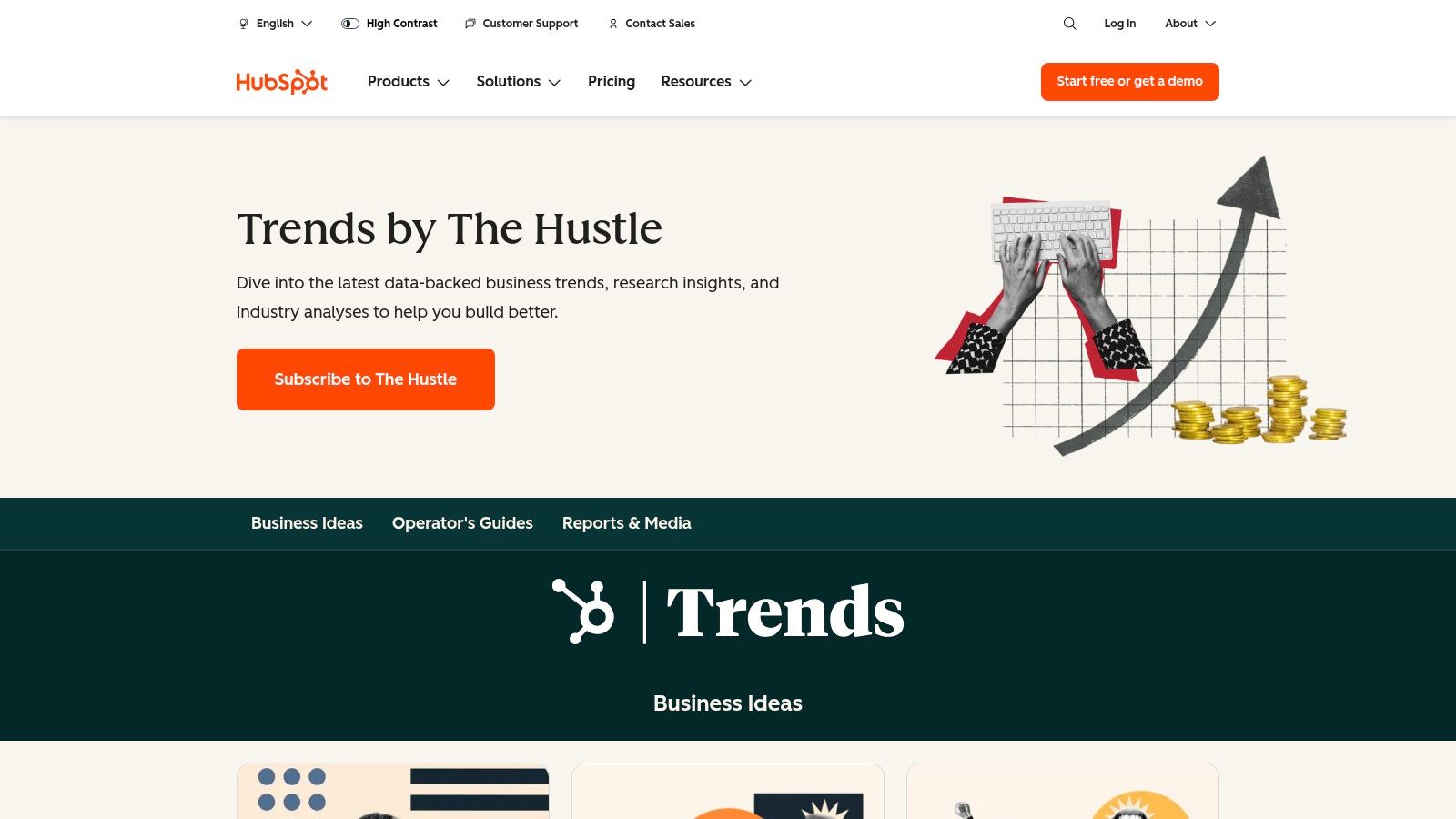
The platform’s strength lies in its curation. Instead of overwhelming you with raw data, its team of analysts identifies specific, often underserved, market gaps and presents them as detailed business opportunities. This approach saves countless hours of research and helps founders focus on building, not just brainstorming.
Key Features and Benefits
- Curated Business Ideas: Receive weekly reports that break down emerging trends, market size, and monetization strategies for specific software and tech-enabled businesses.
- Active Entrepreneur Community: Gain access to a private network of thousands of founders and builders to get direct feedback, find partners, and test software concepts with a relevant audience.
- In-Depth Case Studies: Learn from detailed breakdowns of successful companies, understanding their growth tactics, revenue models, and operational strategies.
- Live Events and Workshops: Participate in lectures and Q&A sessions with industry experts and successful entrepreneurs to deepen your knowledge.
How to Use It for Software Ideas
A powerful strategy is to leverage the community for rapid validation. After identifying a promising opportunity from a Trends report, such as a "niche CRM for tradespeople," you can create a poll or discussion thread in the community to gauge interest. Ask pointed questions about pain points and willingness to pay. This direct feedback from fellow entrepreneurs is invaluable for refining your idea before writing a single line of code.
Pricing: Access is typically granted through an annual subscription of $299. The platform frequently offers promotional trials, such as $1 for one week of full access. Be aware that the subscription model is billed annually, and refund policies after the trial period can be strict.
Final Takeaway: Trends by The Hustle is perfect for serious entrepreneurs who value curated insights and community feedback over raw data, providing a direct path from idea to a validated software business concept.
4. Starter Story
Starter Story is a massive library of founder case studies and business playbooks, offering an inside look at how thousands of entrepreneurs built successful companies from the ground up. Unlike platforms that focus purely on market trends, Starter Story provides real-world narratives, complete with revenue figures, marketing strategies, and timelines. This makes it an exceptional resource for sourcing and validating business ideas in software by learning directly from the successes and failures of others.
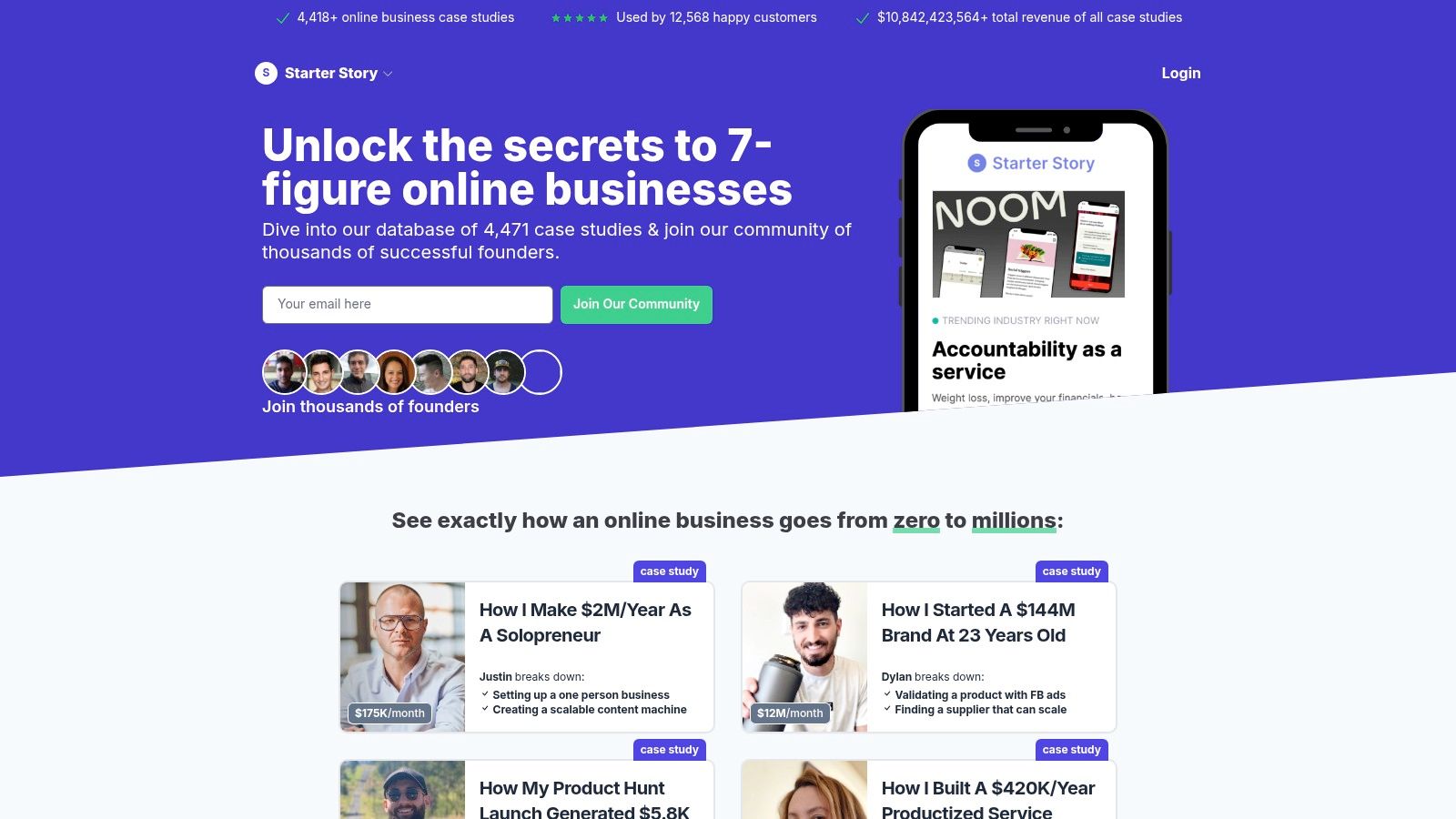
The platform’s core strength lies in its detailed financial transparency. Founders openly share their startup costs, monthly recurring revenue, and growth tactics, giving you a realistic financial blueprint. This data demystifies the process of launching a SaaS product and helps you calibrate your own business plan with proven benchmarks.
Key Features and Benefits
- Founder Case Studies: Access over 4,000 interviews with founders, detailing their journey, financials, and key lessons learned.
- Idea Databases: Explore more than 30 databases of business ideas, market trends, and industry opportunities to spark your next software concept.
- AI-Powered Tools: Use the Idea Validator to get feedback on your concept or the Idea Remixer to generate new software ideas by combining different business models and niches.
- Community & Courses: Higher-tier plans include access to a private Slack community, workshops, and educational content to guide you through the startup process.
How to Use It for Software Ideas
Begin by filtering the case studies by industry (e.g., "SaaS") and revenue. Study the stories of founders who built businesses similar to what you envision. Pay close attention to their "Advice for other entrepreneurs" section, as it often contains actionable insights on customer acquisition and avoiding common pitfalls. Use the Idea Databases to find underserved niches and cross-reference them with case studies to see if a similar model has been proven successful.
Pricing: Starter Story offers a "Starter" plan at $99/year for access to the case study library and some idea databases. The "Founder" plan at $399/year unlocks all content, AI tools, and the community. Visit https://www.starterstory.com for more details.
Final Takeaway: Starter Story is the ideal platform for aspiring founders who value learning from real-world examples. It replaces abstract business theory with concrete data and actionable playbooks from those who have already built profitable software companies.
5. Product Hunt
Product Hunt is a go-to platform for discovering the latest software products, tools, and mobile apps as they launch. It functions as a daily leaderboard where the tech community curates, upvotes, and discusses new products. For founders searching for business ideas in software, it provides a real-time feed of what's currently being built, what problems are being solved, and which niches are attracting attention. By observing launch trends, you can spot emerging market needs and identify gaps that your own idea could fill.
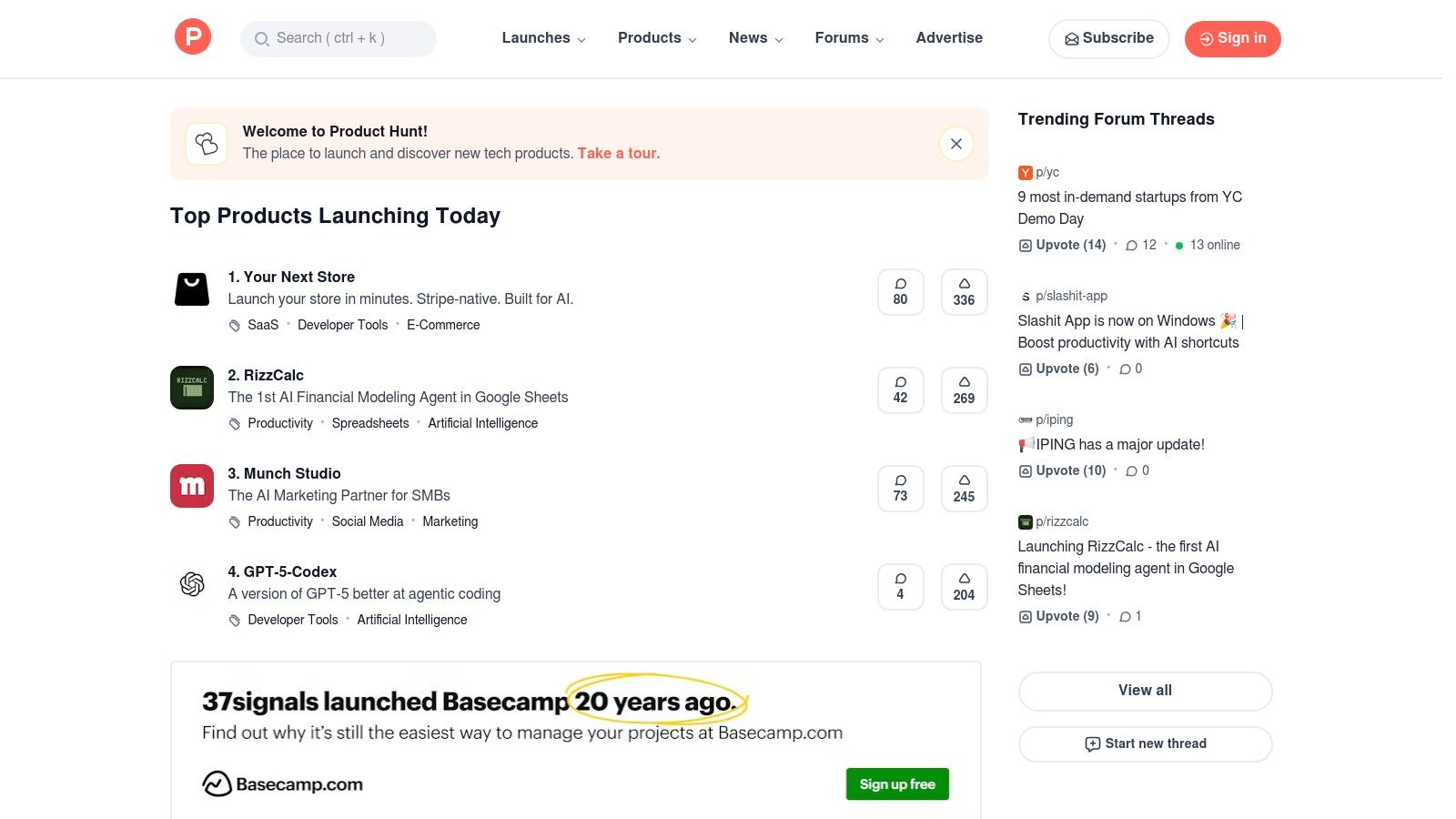
The platform's value lies in its community-driven validation. The comments and upvotes on a product launch offer direct, unfiltered feedback from early adopters, developers, and potential customers. This qualitative data is invaluable for understanding user pain points and feature requests, giving you a competitive advantage before you even write a single line of code.
Key Features and Benefits
- Daily Leaderboard: See a ranked list of the day's top product launches, giving you a pulse on what's currently trending in the tech world.
- Community Feedback: Access detailed comment threads where users, investors, and makers discuss a product's strengths, weaknesses, and potential use cases.
- Categorization and Collections: Products are sorted into specific categories (e.g., "Productivity," "AI," "Developer Tools"), making it easy to research a particular niche.
- Maker Goals & Stories: Many founders share their journey, goals, and the problems they are solving, which provides deep context behind the software.
How to Use It for Software Ideas
A strategic way to use Product Hunt is to analyze "unbundling" opportunities. Look for successful, feature-rich products and read through the comments to find a single, highly-requested feature that users love. You could build a leaner, more focused SaaS product that does that one thing exceptionally well. For example, if a popular project management tool gets praise for its unique reporting feature, you could create a standalone reporting app. Discover more strategies for developing a strong brand, such as choosing the right app name ideas for a specific niche, to complement your findings.
Pricing: Product Hunt is completely free to browse, discover products, and participate in discussions. The platform's revenue comes from advertising options for companies that want to promote their launch.
Final Takeaway: Product Hunt is an essential daily resource for competitive analysis and idea validation. It shows you what the market is actively building and celebrating, offering a direct line of sight into current software trends and underserved user needs.
6. Acquire.com (formerly MicroAcquire)
Acquire.com is the world's largest curated marketplace for buying and selling startups, with a heavy emphasis on SaaS and micro-SaaS businesses. Instead of generating an idea from scratch, this platform allows entrepreneurs to acquire an existing, revenue-generating software product. This unique approach lets you bypass the risky early stages of development and validation, offering a different pathway to finding solid business ideas in software by purchasing a proven concept.
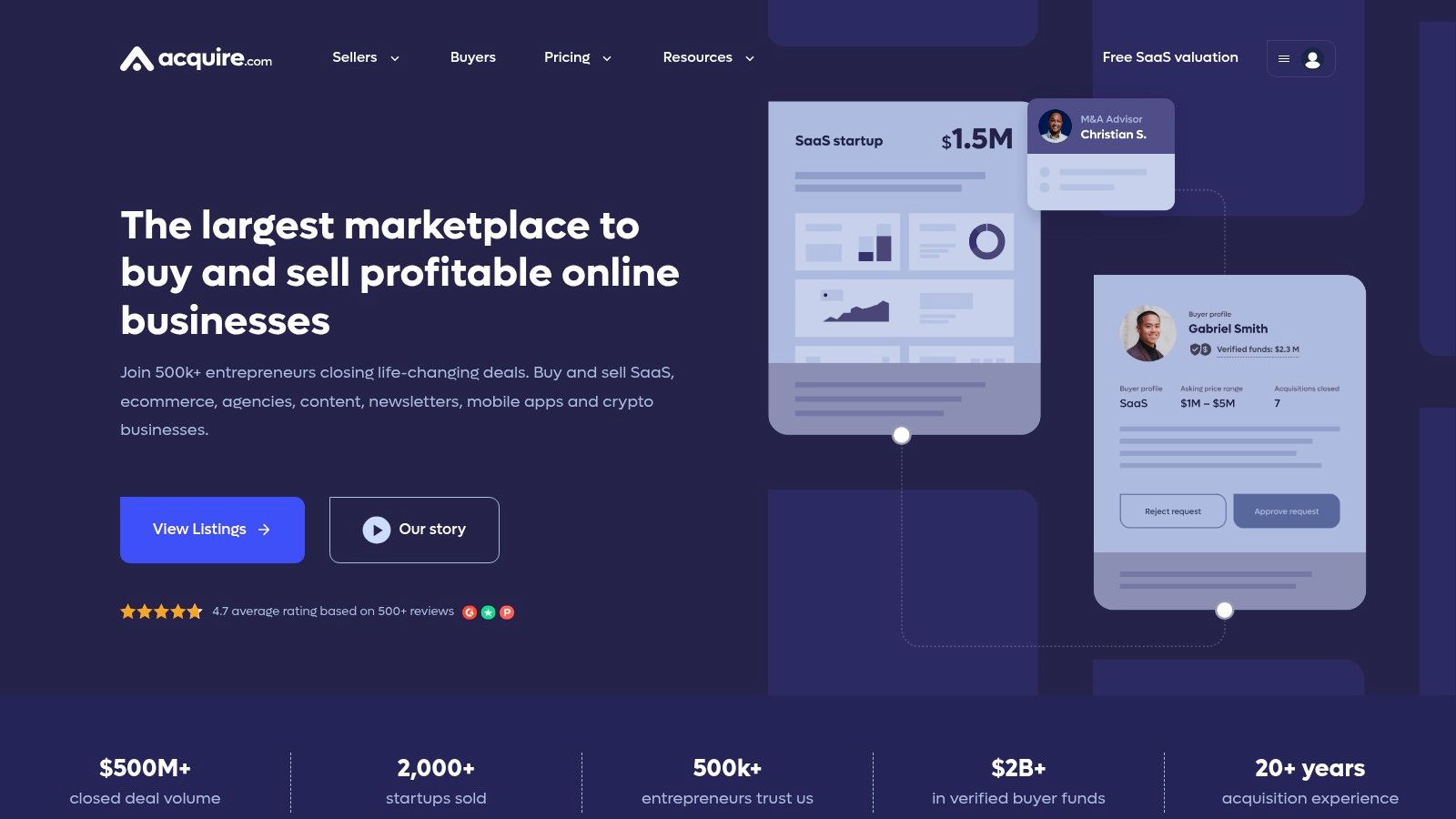
The platform stands out by providing a secure and transparent environment for transactions. Sellers list their businesses with detailed metrics like monthly recurring revenue (MRR), customer count, and tech stack. Buyers can then filter these listings to find opportunities that match their budget, skills, and industry interests, effectively shopping for a pre-built business.
Key Features and Benefits
- Vetted Startup Listings: Browse a large, curated inventory of SaaS, e-commerce, and content businesses with key metrics available upfront. More sensitive data is accessible after signing a non-disclosure agreement.
- Integrated Transaction Tools: The platform includes secure messaging, valuation calculators, and letter of intent (LOI) templates to streamline the acquisition process.
- Secure Deal Flow: Features like integrated escrow services and support for legal documentation ensure that both buyers and sellers are protected throughout the transaction.
- Educational Resources: Acquire.com offers extensive free resources, including courses and guides on how to buy and sell a startup, making it accessible even for first-time buyers.
How to Use It for Software Ideas
Instead of building, you're buying a foundation to grow. A great strategy is to filter for SaaS businesses with under $5,000 in MRR that show potential but may be undermanaged. You might find a niche B2B tool with a solid product but poor marketing. By acquiring it, your primary task shifts from product development to growth marketing and feature enhancement, which is a significantly less risky venture. You can learn more about acquiring businesses at Acquire.com.
Pricing: Browsing is free for buyers. To contact sellers and access private deal information, a paid "Buyer" membership is required, starting at $390 per year. There are premium tiers that provide access to larger, more exclusive deals.
Final Takeaway: Acquire.com is perfect for entrepreneurs who have capital and want to skip the 0-to-1 phase. It’s a shortcut to owning a cash-flowing software business, allowing you to focus on scaling an already-validated product.
7. Amazon (Books and eBooks on Software Entrepreneurship)
While not a dedicated idea-generation tool, Amazon's vast library of business books serves as a foundational resource for understanding the principles behind successful ventures. It offers curated knowledge from seasoned entrepreneurs, investors, and technologists who have already navigated the complex process of building and scaling software companies. This makes it an essential starting point for anyone looking to build a framework for identifying and validating business ideas in software.
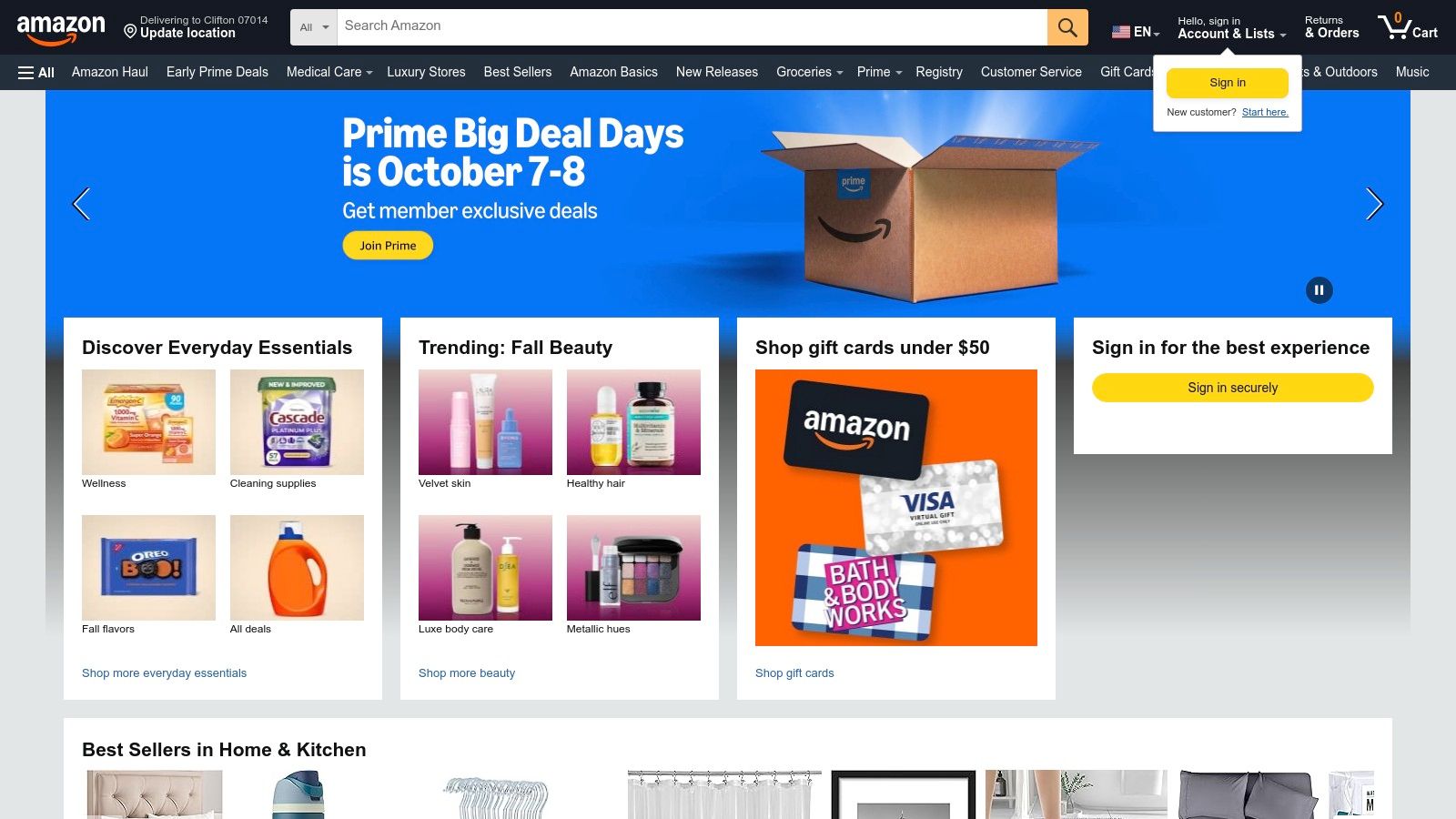
The platform's strength lies in its diversity of perspectives, covering everything from lean startup methodologies and customer development to niche-specific go-to-market strategies. By studying these playbooks, you can learn to recognize patterns in market needs, understand customer pain points, and build a mental model for what makes a software product viable long-term.
Key Features and Benefits
- Bestseller Lists: Live bestseller charts in categories like "Business Development" and "Entrepreneurship" highlight what concepts and strategies are currently resonating.
- Multiple Formats: Content is available in print, Kindle eBook, and Audible audiobook formats, catering to different learning preferences and on-the-go consumption.
- User Reviews and Ratings: In-depth customer reviews help you vet the quality and relevance of a book before purchasing, ensuring you invest time in high-impact material.
- Broad Subject Coverage: Find classic startup guides like "The Lean Startup" alongside modern titles on AI business models, SaaS metrics, and acquisition entrepreneurship.
How to Use It for Software Ideas
Instead of searching for direct ideas, use Amazon to build a strategic foundation. Start by reading established frameworks on customer discovery, such as "The Mom Test" by Rob Fitzpatrick. Use the insights to structure interviews with potential customers in a niche you're exploring. The concepts learned will help you uncover genuine problems that can be solved with a software product, moving you from abstract brainstorming to evidence-based idea generation.
Pricing: Book prices vary widely. Many titles are available for free with an Audible or Kindle Unlimited subscription. Prime members often benefit from free shipping and special offers.
Final Takeaway: Amazon is the ultimate educational resource for aspiring founders. It doesn't give you the ideas directly; it equips you with the mental frameworks and strategic knowledge needed to discover and build great software businesses on your own.
Key Feature Comparison of 7 Business Idea Platforms
| Item | Implementation Complexity 🔄 | Resource Requirements ⚡ | Expected Outcomes 📊 | Ideal Use Cases 💡 | Key Advantages ⭐ |
|---|---|---|---|---|---|
| SaaSThink | Moderate – AI-driven system, credit-based usage | Low to moderate – free and one-time payment plans | High – unique, market-ready SaaS ideas quickly | Entrepreneurs seeking validated SaaS ideas fast | Rapid AI idea generation, comprehensive market data |
| Exploding Topics | Moderate – trending data analysis and APIs | Moderate to high – subscription and API costs | Medium to high – early trend identification | Spotting emerging niches and forecasting software trends | Early signals for niches, API access |
| Trends by The Hustle | Low – curated content and community engagement | Moderate – annual subscription required | Medium – vetted business ideas and peer feedback | Entrepreneurs needing vetted ideas and community support | Curated insights, strong peer network |
| Starter Story | Moderate – case studies + AI tools, paywall access | Moderate – tiered subscription with paywall content | High – validated ideas with real financial data | Validating SaaS plans with data and operational insights | Extensive founder data, AI validation tools |
| Product Hunt | Low – community-driven, free access | Low – free to use, optional paid promotion | Low to medium – early validation and discovery | Discovering new software launches and competitive analysis | Real-time product discovery, community feedback |
| Acquire.com | Moderate – marketplace setup, membership tiers | Moderate to high – paid memberships and transaction fees | High – acquiring revenue-generating startups | Entrepreneurs buying established SaaS businesses | Vetted startups, integrated acquisition tools |
| Amazon (Books and eBooks) | Low – access to published educational materials | Low to moderate – purchase of books and eBooks | Medium – foundational knowledge for entrepreneurship | Learning startup frameworks and software business basics | Wide selection, multiple learning formats |
From Idea to Impact: Your Next Steps
The journey from a spark of inspiration to a thriving software business is one of strategy, validation, and relentless execution. We've explored a powerful arsenal of tools designed to guide you through this critical initial phase. From the trend-spotting prowess of Exploding Topics and Trends by The Hustle to the raw, first-hand accounts on Starter Story, you now have a roadmap to uncovering and evaluating your next venture.
Each platform offers a unique lens through which to view the landscape of business ideas in software. Product Hunt provides a real-time glimpse into what the market is currently embracing, while Acquire.com presents an alternative path to entrepreneurship through acquisition. Even a simple resource like Amazon’s collection of business books can arm you with the foundational knowledge needed to avoid common pitfalls. The core takeaway is clear: successful software businesses are not born from isolated moments of genius, but from a deliberate process of research, analysis, and community engagement.
Turning Insights into Action
The true value of these resources lies not in passively consuming information, but in actively using them to build a system for ideation and validation. Your next steps should focus on creating a repeatable process to filter and refine potential opportunities.
Here’s a practical framework to get you started:
-
Synthesize and Combine: Don't rely on a single source. A powerful approach is to combine insights from multiple platforms. For instance, identify a burgeoning trend on Exploding Topics, then search for that keyword on Starter Story to understand how founders are monetizing it. Cross-reference this with Product Hunt to see what related tools are launching and how users are reacting to them.
-
Focus on the "Why": A great idea solves a painful, specific problem. As you browse, constantly ask yourself: Who is this for? What specific pain point does this eliminate? Is the target audience willing to pay for a solution? The most durable business ideas in software are those deeply rooted in solving a tangible need, not just capitalizing on a fleeting trend.
-
Validate Before You Build: The biggest mistake an entrepreneur can make is building a product nobody wants. Before writing a single line of code, leverage these tools for early validation.
- Community Engagement: Engage with discussions on platforms like Product Hunt or related forums.
- Keyword Analysis: Use trend data to assess search volume and audience interest.
- Founder Interviews: Reach out to entrepreneurs in a similar space (as found on Starter Story) for informational interviews.
Ultimately, the goal is to de-risk your venture by confirming that a real market exists for your solution. The tools we’ve discussed are your allies in this crucial validation phase, helping you pivot or persevere based on data, not just on gut feeling. Armed with this strategic approach, you are now perfectly positioned to move from ideation to impact and build a software business that truly matters.
Ready to find a high-potential, low-competition SaaS idea tailored to your skills? SaaSThink uses AI to analyze market gaps and generate personalized business ideas in software, complete with validation data and launch strategies. Stop guessing and start building with confidence by visiting SaaSThink today.


